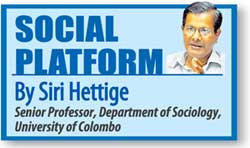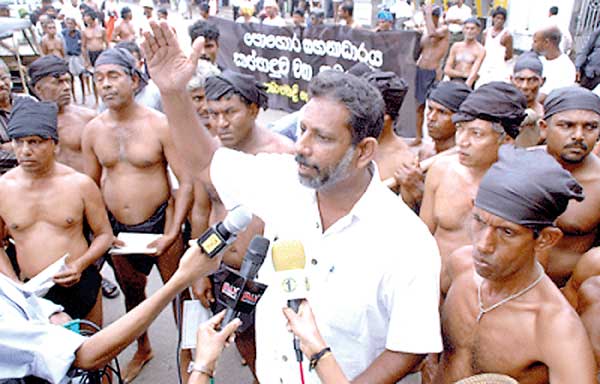Reply To:
Name - Reply Comment
 Development trajectories have diverged widely across countries over time, depending on a whole array of complex factors. Understanding these factors is important, and the social sciences have played a critical role in unravelling the complexities involved. A significant feature of historical trends in this regard has been the cumulative nature of economic and societal development. The knowledge economy is a state of a country’s economy that has been built over many past developments in economic, social, cultural and political spheres. So a country that has done precious little in the recent past to produce and apply new knowledge to resolve economic and other issues could hardly aspire to become a knowledge economy. In this regard, it is important to recognise the clear nexus between knowledge society and knowledge economy; one cannot exist without the other. A society rampant with superstition, ignorance and scientific illiteracy is certainly not a knowledge society.
Development trajectories have diverged widely across countries over time, depending on a whole array of complex factors. Understanding these factors is important, and the social sciences have played a critical role in unravelling the complexities involved. A significant feature of historical trends in this regard has been the cumulative nature of economic and societal development. The knowledge economy is a state of a country’s economy that has been built over many past developments in economic, social, cultural and political spheres. So a country that has done precious little in the recent past to produce and apply new knowledge to resolve economic and other issues could hardly aspire to become a knowledge economy. In this regard, it is important to recognise the clear nexus between knowledge society and knowledge economy; one cannot exist without the other. A society rampant with superstition, ignorance and scientific illiteracy is certainly not a knowledge society.
Sri Lanka emerged from its long colonial past as a vibrant, progressive and independent state moving in the direction of social and economic development. The country was on its way to build modern institutions, to promote general and higher education, scientific research in many applied areas and manage existing and emerging issues on the basis of scientific know-how, be it in agriculture or health. The incipient intellectual elite that had already emerged shared a scientific ethos with their peers elsewhere and talked very much in the language of rational planning. Yet, two major developments in the country following independence prevented the emergence of a unified state and the building up of the country’s intellectual resources. Firstly, the worsening ethnic and political divisions prevented the country from mobilising its human and material resources to pursue a set of shared national goals cutting across the entire social spectrum. Secondly, the emerging uncertainties and conflicts hampered the accumulation of intellectual resources and building up of vibrant centres of intellectual activity as many up-and-coming scientists and intellectuals found their way out of the country.
" A country that has done precious little in the recent past to produce and apply new knowledge to resolve economic and other issues could hardly aspire to become a knowledge economy "
The early technocratic orientation of the state was steadily giving way to a more populist form of administration, more responsive to the need for accommodating dominant social and political demands than to the need for building and sustaining modern institutions and dispelling myths and superstition pervasive in society at the time. The entire education system came to be steadily shaped by social and political considerations rather than the imperatives of social and economic advancement of the country as a whole. It became the dominant avenue of upward social mobility for marginalised sections of society rather than a vehicle for promoting academic excellence, rational thinking, scientific literacy, knowledge production and its various applications for improving productivity, production processes, institutional development and planning for economic and social development. So, the expansion of the education system over several decades after independence did not prepare the ground for the development of intellectual and scientific capacities of the country. The continuing exodus of highly skilled human resources from the country over the last several decades has made the situation worse.

" The entire education system came to be steadily shaped by social and political considerations rather than the imperatives of social and economic advancement of the country as a whole "
The service sector has become the most lucrative sphere of investment for local and foreign capital. Rapid change in the landscape of Colombo characterised by a proliferation of high rise commercial and residential buildings in the western half of the city shows the overwhelming bias in the economy in favour of service industries like construction, trade, telecommunication, tourism and transportation.
" In spite of the rhetoric to the contrary, the actual state policy does not appear to be converting the local universities to centres of knowledge production and catalysts for social and economic advancement "
It is obvious that the local economy as it is structured today cannot accommodate and retain the country’s labour force in a reasonable and competitive manner. Over 20% of the labour force is employed abroad and the country uses the remittances sent by them to pay for imports and service debts. Even though less than 5% of the country’s youth have higher education, the economy has no use for the vast majority of those who pass out from the local university system, partly reflecting their quality and partly reflecting the inability of the economy to absorb educated labour. In spite of the rhetoric to the contrary, the actual state policy does not appear to be converting the local universities to centres of knowledge production and catalysts for social and economic advancement. The current levels of public investments in education, research and development and the way we manage educational institutions clearly attest to this fact. This is no doubt a matter for concern for those who believe in the strong connection between scientific innovation and economic development. As many South-east Asian countries like Korea, China and Singapore have demonstrated in no uncertain terms, deep historical traditions do not necessarily stand in the way of scientific innovation and their applications for development and public welfare. The critical factor in these countries seems to be the increasing technocratic orientation of their political and other elites. As a result, both public as well as private investments have been directed to developing the innovative and productive capacities of the younger generations in order to provide them with challenging and lucrative employment opportunities, leading to sustained economic development and increasing quality of life for the wider population. We on the other hand, continue to live in the past steeped in our age old traditions and religious beliefs almost at the expense of rational thinking and innovation.